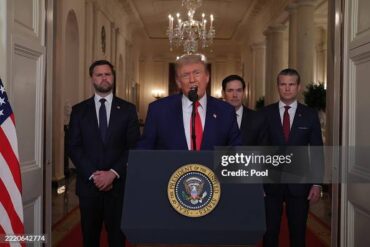US stocks surged on Monday after President Donald Trump’s top trade officials brokered a surprisingly dramatic de-escalation in trade tensions with China over the weekend, dropping tariffs to much lower levels, which some economists say could stave off a US recession.
The Dow rose more than 1,000 points, or 2.5%. The broader S&P 500 was 2.85% higher, and the tech-heavy Nasdaq Composite gained 4%.
US stocks were set to erase all their losses since Trump’s April 2 “Liberation Day” trade announcement, which placed a 10% tariff on practically all goods coming into the United States and set significantly higher tariffs on dozens of countries. Trump paused most of those tariffs just days after they went into effect but jacked up import taxes on China – eventually to 145% on most Chinese imports.
In turn, China hiked tariffs on US goods to 125%. The tit-for-tat trade war had effectively stopped trade between the two countries, risking substantial price hikes and shortages.
Trump and Treasury Secretary Scott Bessent both had said in recent weeks that tariffs on China had grown unsustainably high and a détente was necessary. But few believed that the result of the discussions between Bessent, US Trade Representative Jamieson Greer and their Chinese counterparts in Geneva this weekend was going to be quite so significant.
Both sides agreed to axe tariffs by 115 percentage points, still leaving the levies considerably higher than where they were before Trump took office in January – but much, much lower than the historic level over the past month that deeply concerned American businesses, consumers, economists and investors.
“There are still lots of factors pointing away from a (global) recession, and this morning’s news of lower US-China tariffs adds to that evidence,” Henry Allen, a strategist at Deutsche Bank, said in a note to investors Monday morning. “The market’s resilience itself is making a recession less likely by easing financial conditions. And policymakers don’t want a downturn or market turmoil either, as we saw with the 90-day extension to the reciprocal tariffs.”
As a result, Wall Street cheered Monday morning. Investors showed greater appetite for riskier assets, including stocks. The US dollar rose 1.2% against a basket of currencies. US oil, which had tumbled as investors feared a demand vacuum because of a tariff-induced global recession, surged 3.4% to $63 a barrel. Brent crude, the international benchmark, rose 3.2% to $66 a barrel.
By contrast, investors sold off save-haven assets, such as gold, which tumbled 2.5%. US Treasuries also fell, sending the 10-year yield back above 4.45%. Bond prices and yields trade in opposite directions. Japan’s yen fell 1.5%.
The CBOE Volatility Index, Wall Street’s fear gauge, sank 10% to its lowest level since the end of March. “Greed” was the sentiment driving markets, according to CNN’s Fear and Greed index.
Tech stocks were particular winners: Despite a recent US carveout for hardware from tariffs on China, tech had been rocked in particular by the trade war between the US and China, because of the deeply intertwined relationship between American and Chinese technology sectors. Apple (AAPL) gained 7%, Tesla (TSLA) rose 7.7%, Nvidia (NVDA) was up 5.1%, Amazon (AMZN) rose 8% and Intel (INTC) was up 4.1% Monday morning.
Stocks of luxury goods makers, which had tumbled in recent months, bounced back sharply: Hermes rose 4%, Burberry was up 6% and LVMH surged 7%.
Automakers also surged: Jeep and Chrysler maker Stellantis (STLA) was up 9%, General Motors (GM) rose 4% and Ford (F) was up 2%.




